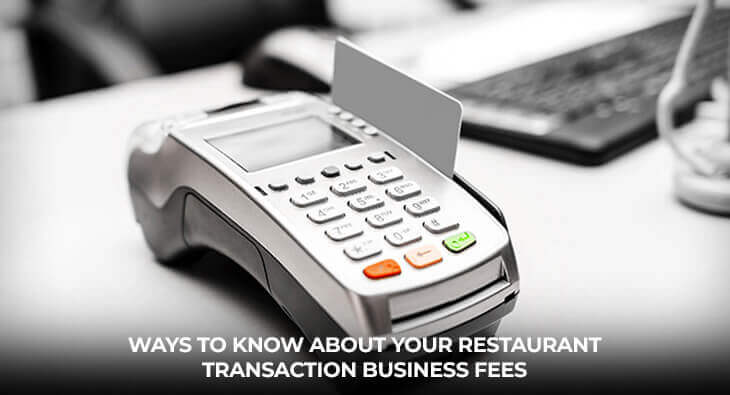According to a survey, in 2019, there were over 700,000 restaurants/hotels in the United States. For this reason, running a restaurant is the toughest task. It is very competitive and capital-oriented. In this industry, restaurant management and credit card processing fees is the biggest expense as it may require focus on employee productivity, process improvement, and ways to know how to control and cut costs in a restaurant. The majority of income gets through credit card payments, therefore restaurant transaction fees need to be factored in as a key cost component to be in those hands which can control the expense. Credit Card processing plays a major role in this segment as this allows us to proceed ahead.
Credit Card Processing Fees are a Big Expense
On average the gross profit margin after giving away the wages for a restaurant is approximately 32%. This is a pretty good margin and allows little space in the room when you still have to get some stuff like ingredients and to be on the safer side in case of an emergency. In addition, the cost of accepting credit cards can range in a huge segment, but it is still an absolutely important part of doing business. For example :
- 92% of restaurants are credit cards holder.
- 81% of US restaurant income is from debit and credit cards
- 74% of consumers prefer to swipe their debit or credit cards at restaurants
If we see that Restaurant transaction fees on average fall between 2 to 4.2% per transaction. If a restaurant averages $30,000 per month in income, gross profit after wages will average $10,200. Financial transaction fees will average $600-$1,320. This is how it works
How are Restaurant Transaction Fees obsessed?
Against the popular opinion, credit card company or networks such as Visa, Mastercard, or Discover does not completely determine the merchantstronghold.com free-credit-card-processing credit card processing fees. Four companies charge a fee, which together makes up the transaction fee that a restaurant has to pay at the end. These are:
1. The Issuing Bank: The financial institution that issues the card (e.g. Bank of America, Capital One, Chase, etc.)
2. The Credit Card Network: The famous and reliable card companies (e.g., Visa, Discover Mastercard, etc.)
3. The Payment Processor: The company is answerable for securing and carrying out the credit card transaction.
4. The Payment Hardware Company: The company that makes the card swiping machine or POS terminal.
Every one of the four companies involved in the transaction takes a certain amount of percentage of the actual payment made to the restaurant.
Let’s calculate by the Example:
A Customer pays $100.00 for their meal.
Issuing Bank charges 1.0 to 2.22%
Credit Card Network charges 0.8 to .1.8%
Payment Processor charges .2 to .42%
= Between $98 to $92.20 net to the restaurant. While on the other side, the other companies get anywhere from $2 to $4.20 on that $100 ticket. And those costs add up!
Reducing Your Costs by Evaluating Your Transaction Fees
If you think that the majority of fees go to your payment processor then you are wrong. Instead, they go directly to the Issuing banks and MasterCard, Visa, Discover, etc. in the form of Interchange and Assessment fees. For this reason, such fees are typically not open to change. The token of transaction fees goes to your payment processor to cover the cost of the payment terminal and credit card processing fees are initiated in clearing and routing the transaction and depositing the money into your merchant account.
![]()
Email us anytime!
Email customer service 24/7
![]()
Call us anytime!
Reach customer care 24/7 at +1 (727) 330-3944
Every restaurant needs to accept credit card payments as it will give a wide range of accepting the bills from the customer. However, restaurant management calculates fees regularly to operate the restaurant’s profitability and performance. When you have a great idea of where you stand with your restaurant payment processing company, you can look at techniques to reduce their fees through some compensation or find a different payment processor altogether that will give you a comfortable rate. You can also reduce the fees by deducting them from your taxes. By reducing credit card processing fees, you will cut costs in a restaurant and therefore improve your bottom line.
Calculate and Lower Your Restaurant Fees
Know which payment processing fees are ready to reduce their fees.
Payment processors charge majorly 3 basic types of fees: flat fees, situational fees, and processing fees.
Flat fees include fees for online reporting, network charges, payment gateway fees, annual fees, and fees for statements. Some fees can be negotiated by the holder while some are not.
Situational fees are those charged as the situation comes all of a sudden for things like cancellations, chargebacks, international credit cards, and not meeting monthly sales minimums. They also have negotiable rates for some of these fees.
Debit and credit card processing fees will be the lion’s share of costs found on your monthly statement. This is commonly known as the king of all.
Each of these types of fees has its variability when it comes to negotiating. But, most importantly you should know your category so that it’s easy to know why your payment processor takes these fees in the first place, you will be in a better state to negotiate them down to a manageable rate.
Know which pricing method your restaurant is practicing for so long
Your credit card payment processor can use one of four pricing methods:
1. Cost-Plus: The processing fee is based on the interchange fee plus a percentage of the total transaction plus a card brand fee and a per-transaction flat fee.
2. Fixed or Flat Fee: The processing fee is based on a fixed percentage of each transaction plus a dollar amount.
3. Interchange Differential: The processing fee is based on the difference between the card network interchange rate and the interchange rate based on the type of card it is, plus the card brand fee, plus the interchange rate.
4. Tiered Fee: Different processing fees are charged depending on the tier the transaction falls in. Tiers are based on which type of business, the type of card, and the type of transaction. For an example of business types making a difference, a large, popular restaurant will have a higher transaction volume compared to a small, local establishment.
The type of card used is another determining factor because not all credit and debit cards are made the same. Some have low limits and no benefits while others accumulate mileage and cashback rewards. And that matters because the processor will be paying for that cashback reward that the card offers. Lastly, the type of transaction will affect the cost of that transaction. Customers paying in-store will be relatively low risk and so will be a lower cost, but if the customer wants to pay online, over the phone, or through an app, higher fees are incurred. This card-not-present (CNP) fees are a higher cost because they pose a higher risk to the bank and the payment processor supporting your transactions.
Look at the mix of credit cards being used by customers.
Part of the processing fees is the cost came with the type of card and the method of payment. Rewards credit cards cost you more per transaction than debit cards or basic credit cards with no facilities. In addition, less secure methods of payment will cost high per transaction than the chip and PIN method because they’re more delicate to fraud. Payment processors can also charge an additional processing fee to route International credit card transactions.
Make sure that the pricing model you have is an excellent fit for your restaurant based on the credit mix. For example, flat-fee pricing charges the same rate for all types of credit cards. but the transaction fees can be higher to cover the risk. A Cost Plus pricing model charges additional fees for higher-end credit cards, but a large restaurant that caters to higher-end customers can usually defray costs with higher transaction volumes.
Related Blog
- Learn How Payment Processing Works in Easy Steps
- Merchant Account And Secure Payment Gateway
- How to Start a CBD Business: Directing About CBD Industry
- Ways to know about your restaurant transaction business fees
- Sell Your Custom Nutraceutical Supplements Online
4 . Check for hidden charges and ask your processor about them.
Some payment processors don’t fully disclose their charges. They may charge a flat fee for services that you don’t even use, bury high fees in unnecessary surcharges, or charge fees if you don’t meet a minimum sales quota each month. Your contract will tell the fees you are charged. If they are not easy to understand, you may want to look for a partner that communicates their fees honestly.
Restaurant credit card processing fees are transaction fees that are in control and which can be negotiated. If you are paying much in transaction fees, you’ll want to do your research and choose payment processing companies that cater to your industry and offer solutions that are correct for your specific restaurant. Look for a payment processor that offers:
- Competitive, transparent pricing
- Quick, reliable, secure payment deposits
- Same-day or next-day deposits
- Easy integration with your current systems
- Solutions to mitigate risk factors or fraud
- Updated POS systems including mobile and wireless options
- Quality service and live support
Enquiring about your restaurant’s credit card payment processing fees is part of the job. Luckily, with a credit card payment processor that you can trust, having that conversation and breaking down your contract will be a breeze.
Merchant Stronghold
As we talk about Merchant Stronghold apart from giving merchant account services and managing high-risk merchant accounts we provide an amazing credit card processing facility with the smooth working of it. With providing you with an amazing and best fees structure suiting your business type. Merchant stronghold gives you a 24*7 service and experts guidance.


